#Amazon Virtual Private Cloud (Amazon VPC)
Explore tagged Tumblr posts
Text
Virtual Private Cloud (VPC) Flow Logs in Amazon Web Services (AWS) is an indispensable feature for developers, network administrators, and cybersecurity professionals. It provides a window into the network traffic flowing through your AWS environment, providing the visibility needed to monitor, troubleshoot, and secure your applications and resources efficiently.
2 notes
·
View notes
Text
VPC, Subnet, NACL, Security Group: Create your own Network on AWS from Scratch [Part 2]
Amazon Virtual Private Cloud (Amazon VPC) enables you to launch AWS resources in a logically isolated virtual network that you have created. This virtual network closely resembles a traditional network that you’d operate in your own data centre, with the benefits of using the scalable infrastructure of AWS. Please see how to Build a Scalable VPC for Your AWS Environment [Part 1], how to Hide or…

View On WordPress
#Amazon Virtual Private Cloud (Amazon VPC)#AWS#AWS Resource Map#AWS Virtual Private Cloud#AWS VPC#Best Practices for Creating a VPC#NACL#Network Access Control Lists
0 notes
Text
AWS Security 101: Protecting Your Cloud Investments
In the ever-evolving landscape of technology, few names resonate as strongly as Amazon.com. This global giant, known for its e-commerce prowess, has a lesser-known but equally influential arm: Amazon Web Services (AWS). AWS is a powerhouse in the world of cloud computing, offering a vast and sophisticated array of services and products. In this comprehensive guide, we'll embark on a journey to explore the facets and features of AWS that make it a driving force for individuals, companies, and organizations seeking to utilise cloud computing to its fullest capacity.

Amazon Web Services (AWS): A Technological Titan
At its core, AWS is a cloud computing platform that empowers users to create, deploy, and manage applications and infrastructure with unparalleled scalability, flexibility, and cost-effectiveness. It's not just a platform; it's a digital transformation enabler. Let's dive deeper into some of the key components and features that define AWS:
1. Compute Services: The Heart of Scalability
AWS boasts services like Amazon EC2 (Elastic Compute Cloud), a scalable virtual server solution, and AWS Lambda for serverless computing. These services provide users with the capability to efficiently run applications and workloads with precision and ease. Whether you need to host a simple website or power a complex data-processing application, AWS's compute services have you covered.
2. Storage Services: Your Data's Secure Haven
In the age of data, storage is paramount. AWS offers a diverse set of storage options. Amazon S3 (Simple Storage Service) caters to scalable object storage needs, while Amazon EBS (Elastic Block Store) is ideal for block storage requirements. For archival purposes, Amazon Glacier is the go-to solution. This comprehensive array of storage choices ensures that diverse storage needs are met, and your data is stored securely.
3. Database Services: Managing Complexity with Ease
AWS provides managed database services that simplify the complexity of database management. Amazon RDS (Relational Database Service) is perfect for relational databases, while Amazon DynamoDB offers a seamless solution for NoSQL databases. Amazon Redshift, on the other hand, caters to data warehousing needs. These services take the headache out of database administration, allowing you to focus on innovation.
4. Networking Services: Building Strong Connections
Network isolation and robust networking capabilities are made easy with Amazon VPC (Virtual Private Cloud). AWS Direct Connect facilitates dedicated network connections, and Amazon Route 53 takes care of DNS services, ensuring that your network needs are comprehensively addressed. In an era where connectivity is king, AWS's networking services rule the realm.
5. Security and Identity: Fortifying the Digital Fortress
In a world where data security is non-negotiable, AWS prioritizes security with services like AWS IAM (Identity and Access Management) for access control and AWS KMS (Key Management Service) for encryption key management. Your data remains fortified, and access is strictly controlled, giving you peace of mind in the digital age.
6. Analytics and Machine Learning: Unleashing the Power of Data
In the era of big data and machine learning, AWS is at the forefront. Services like Amazon EMR (Elastic MapReduce) handle big data processing, while Amazon SageMaker provides the tools for developing and training machine learning models. Your data becomes a strategic asset, and innovation knows no bounds.
7. Application Integration: Seamlessness in Action
AWS fosters seamless application integration with services like Amazon SQS (Simple Queue Service) for message queuing and Amazon SNS (Simple Notification Service) for event-driven communication. Your applications work together harmoniously, creating a cohesive digital ecosystem.
8. Developer Tools: Powering Innovation
AWS equips developers with a suite of powerful tools, including AWS CodeDeploy, AWS CodeCommit, and AWS CodeBuild. These tools simplify software development and deployment processes, allowing your teams to focus on innovation and productivity.
9. Management and Monitoring: Streamlined Resource Control
Effective resource management and monitoring are facilitated by AWS CloudWatch for monitoring and AWS CloudFormation for infrastructure as code (IaC) management. Managing your cloud resources becomes a streamlined and efficient process, reducing operational overhead.
10. Global Reach: Empowering Global Presence
With data centers, known as Availability Zones, scattered across multiple regions worldwide, AWS enables users to deploy applications close to end-users. This results in optimal performance and latency, crucial for global digital operations.
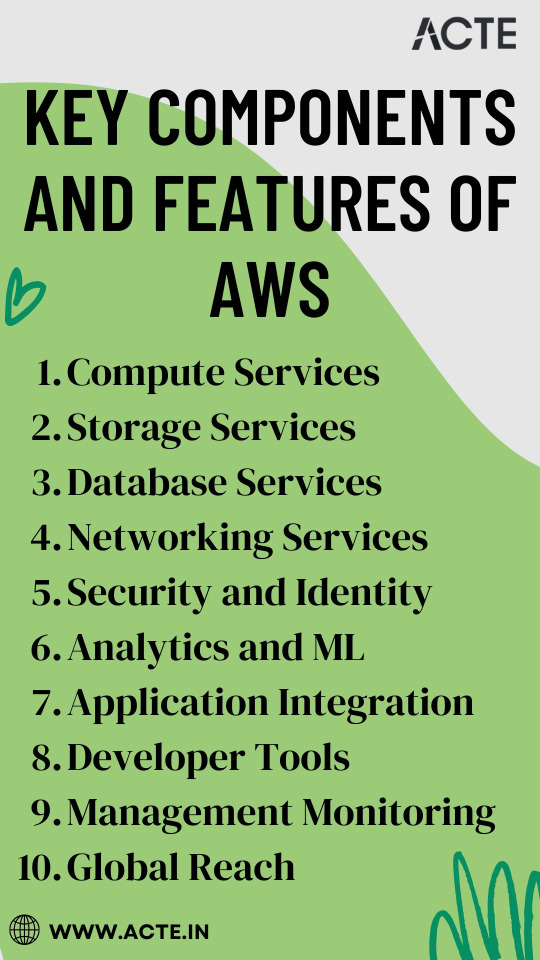
In conclusion, Amazon Web Services (AWS) is not just a cloud computing platform; it's a technological titan that empowers organizations and individuals to harness the full potential of cloud computing. Whether you're an aspiring IT professional looking to build a career in the cloud or a seasoned expert seeking to sharpen your skills, understanding AWS is paramount.
In today's technology-driven landscape, AWS expertise opens doors to endless opportunities. At ACTE Institute, we recognize the transformative power of AWS, and we offer comprehensive training programs to help individuals and organizations master the AWS platform. We are your trusted partner on the journey of continuous learning and professional growth. Embrace AWS, embark on a path of limitless possibilities in the world of technology, and let ACTE Institute be your guiding light. Your potential awaits, and together, we can reach new heights in the ever-evolving world of cloud computing. Welcome to the AWS Advantage, and let's explore the boundless horizons of technology together!
8 notes
·
View notes
Text
Navigating the Cloud Landscape: Unleashing Amazon Web Services (AWS) Potential
In the ever-evolving tech landscape, businesses are in a constant quest for innovation, scalability, and operational optimization. Enter Amazon Web Services (AWS), a robust cloud computing juggernaut offering a versatile suite of services tailored to diverse business requirements. This blog explores the myriad applications of AWS across various sectors, providing a transformative journey through the cloud.
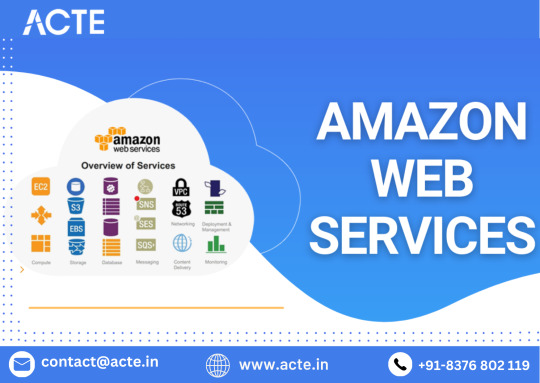
Harnessing Computational Agility with Amazon EC2
Central to the AWS ecosystem is Amazon EC2 (Elastic Compute Cloud), a pivotal player reshaping the cloud computing paradigm. Offering scalable virtual servers, EC2 empowers users to seamlessly run applications and manage computing resources. This adaptability enables businesses to dynamically adjust computational capacity, ensuring optimal performance and cost-effectiveness.
Redefining Storage Solutions
AWS addresses the critical need for scalable and secure storage through services such as Amazon S3 (Simple Storage Service) and Amazon EBS (Elastic Block Store). S3 acts as a dependable object storage solution for data backup, archiving, and content distribution. Meanwhile, EBS provides persistent block-level storage designed for EC2 instances, guaranteeing data integrity and accessibility.
Streamlined Database Management: Amazon RDS and DynamoDB
Database management undergoes a transformation with Amazon RDS, simplifying the setup, operation, and scaling of relational databases. Be it MySQL, PostgreSQL, or SQL Server, RDS provides a frictionless environment for managing diverse database workloads. For enthusiasts of NoSQL, Amazon DynamoDB steps in as a swift and flexible solution for document and key-value data storage.
Networking Mastery: Amazon VPC and Route 53
AWS empowers users to construct a virtual sanctuary for their resources through Amazon VPC (Virtual Private Cloud). This virtual network facilitates the launch of AWS resources within a user-defined space, enhancing security and control. Simultaneously, Amazon Route 53, a scalable DNS web service, ensures seamless routing of end-user requests to globally distributed endpoints.
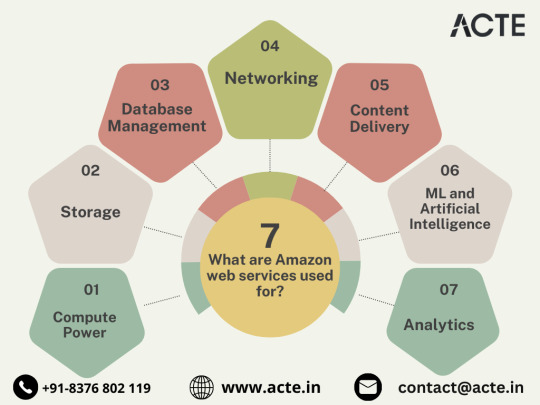
Global Content Delivery Excellence with Amazon CloudFront
Amazon CloudFront emerges as a dynamic content delivery network (CDN) service, securely delivering data, videos, applications, and APIs on a global scale. This ensures low latency and high transfer speeds, elevating user experiences across diverse geographical locations.
AI and ML Prowess Unleashed
AWS propels businesses into the future with advanced machine learning and artificial intelligence services. Amazon SageMaker, a fully managed service, enables developers to rapidly build, train, and deploy machine learning models. Additionally, Amazon Rekognition provides sophisticated image and video analysis, supporting applications in facial recognition, object detection, and content moderation.
Big Data Mastery: Amazon Redshift and Athena
For organizations grappling with massive datasets, AWS offers Amazon Redshift, a fully managed data warehouse service. It facilitates the execution of complex queries on large datasets, empowering informed decision-making. Simultaneously, Amazon Athena allows users to analyze data in Amazon S3 using standard SQL queries, unlocking invaluable insights.
In conclusion, Amazon Web Services (AWS) stands as an all-encompassing cloud computing platform, empowering businesses to innovate, scale, and optimize operations. From adaptable compute power and secure storage solutions to cutting-edge AI and ML capabilities, AWS serves as a robust foundation for organizations navigating the digital frontier. Embrace the limitless potential of cloud computing with AWS – where innovation knows no bounds.
3 notes
·
View notes
Text
Demystifying AWS Virtual Private Cloud (VPC)
In the ever-evolving world of cloud computing, Amazon Web Services (AWS) has established itself as a leader, offering a wide array of services to meet diverse business needs. Among these services, the Virtual Private Cloud (VPC) is one of the most crucial components for organizations seeking to enhance their security and control over their cloud resources. This blog post provides a comprehensive guide to AWS VPC, exploring its features, benefits, and best practices.
If you want to advance your career at the AWS Course in Pune, you need to take a systematic approach and join up for a course that best suits your interests and will greatly expand your learning path.

What is AWS VPC?
AWS Virtual Private Cloud (VPC) allows users to create a private, isolated section of the AWS cloud where they can launch and manage AWS resources. VPC enables businesses to control their virtual networking environment, including IP address ranges, subnets, routing, and security settings.
Key Features of AWS VPC
Custom IP Address Range:
When creating a VPC, you can define your own IP address range using Classless Inter-Domain Routing (CIDR) notation. This flexibility allows you to tailor your network architecture to your specific needs.
2. Subnets:
VPCs can be divided into subnets, which are smaller segments within the VPC. You can create public subnets (accessible from the internet) and private subnets (not directly accessible from the internet) to optimize resource security.
3. Security Groups and Network ACLs:
Security groups act as virtual firewalls for your instances, controlling inbound and outbound traffic. Network Access Control Lists (ACLs) provide an additional layer of security at the subnet level, enabling more granular traffic management.
4. Route Tables:
Route tables are used to determine where network traffic is directed. You can create custom routing rules to control the flow of traffic between your VPC, subnets, and the internet.
5. Internet Gateway and NAT Gateway:
An Internet Gateway allows communication between instances in your VPC and the internet. A NAT Gateway enables instances in a private subnet to initiate outbound traffic while preventing unsolicited inbound traffic.
6. VPN Connections and AWS Direct Connect:
VPC supports VPN connections, allowing secure communication between your on-premises network and your VPC. AWS Direct Connect provides a dedicated network connection, improving performance and reliability.
7. Elastic IP Addresses:
Elastic IPs are static IP addresses that can be associated with your instances, ensuring consistent public IP addresses even when instances are stopped and restarted.
To master the intricacies of AWS and unlock its full potential, individuals can benefit from enrolling in the AWS Online Training.
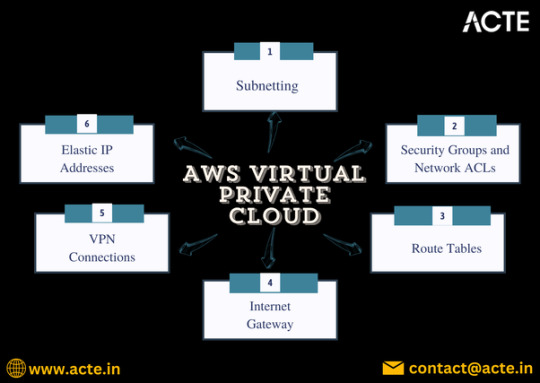
Benefits of Using AWS VPC
Enhanced Security:
By isolating your resources within a VPC, you gain greater control over your network security. You can implement security measures tailored to your specific needs, enhancing data protection and compliance.
Flexibility:
AWS VPC provides the flexibility to design your network architecture according to your requirements. You can easily adjust your IP address ranges, subnets, and security settings.
Scalability:
VPCs are designed to scale seamlessly. You can add or remove resources as needed, ensuring your infrastructure can adapt to changing workloads without performance degradation.
Cost Efficiency:
With AWS's pay-as-you-go pricing model, you only pay for the resources you use. This makes VPC an economically viable option for organizations of all sizes.
Integration with Other AWS Services:
VPC integrates seamlessly with various AWS services, including Amazon EC2, RDS, and Lambda, allowing you to build comprehensive cloud solutions that meet your business needs.
Conclusion
AWS Virtual Private Cloud (VPC) is a vital service for businesses looking to secure and manage their cloud resources effectively. With its extensive features and benefits, VPC empowers organizations to create a customized and controlled network environment.
By understanding how to leverage VPC and adhering to best practices, businesses can maximize their cloud investment and ensure a robust, secure infrastructure. Whether you're new to AWS or looking to enhance your existing setup, mastering AWS VPC is crucial for success in the cloud.
0 notes
Text
aws cloud,
aws cloud,
Amazon Web Services (AWS) is one of the leading cloud computing platforms, offering a wide range of services that enable businesses, developers, and organizations to build and scale applications efficiently. AWS provides cloud solutions that are flexible, scalable, and cost-effective, making it a popular choice for enterprises and startups alike.
Key Features of AWS Cloud
AWS offers an extensive range of features that cater to various computing needs. Some of the most notable features include:
Scalability and Flexibility – AWS allows businesses to scale their resources up or down based on demand, ensuring optimal performance without unnecessary costs.
Security and Compliance – With robust security measures, AWS ensures data protection through encryption, identity management, and compliance with industry standards.
Cost-Effectiveness – AWS follows a pay-as-you-go pricing model, reducing upfront capital expenses and providing cost transparency.
Global Infrastructure – AWS operates data centers worldwide, offering low-latency performance and high availability.
Wide Range of Services – AWS provides a variety of services, including computing, storage, databases, machine learning, and analytics.
Popular AWS Services
AWS offers numerous services across various categories. Some of the most widely used services include:
1. Compute Services
Amazon EC2 (Elastic Compute Cloud) – Virtual servers for running applications.
AWS Lambda – Serverless computing that runs code in response to events.
2. Storage Services
Amazon S3 (Simple Storage Service) – Object storage for data backup and archiving.
Amazon EBS (Elastic Block Store) – Persistent block storage for EC2 instances.
3. Database Services
Amazon RDS (Relational Database Service) – Managed relational databases like MySQL, PostgreSQL, and SQL Server.
Amazon DynamoDB – A fully managed NoSQL database for fast and flexible data access.
4. Networking & Content Delivery
Amazon VPC (Virtual Private Cloud) – Secure cloud networking.
Amazon CloudFront – Content delivery network for faster content distribution.
5. Machine Learning & AI
Amazon SageMaker – A fully managed service for building and deploying machine learning models.
AWS AI Services – Includes tools like Amazon Rekognition (image analysis) and Amazon Polly (text-to-speech).
Benefits of Using AWS Cloud
Organizations and developers prefer AWS for multiple reasons:
High Availability – AWS ensures minimal downtime with multiple data centers and redundant infrastructure.
Enhanced Security – AWS follows best security practices, including data encryption, DDoS protection, and identity management.
Speed and Agility – With AWS, businesses can deploy applications rapidly and scale effortlessly.
Cost Savings – The pay-as-you-go model reduces IT infrastructure costs and optimizes resource allocation.
Getting Started with AWS
If you are new to AWS, follow these steps to get started:
Create an AWS Account – Sign up on the AWS website.
Choose a Service – Identify the AWS services that suit your needs.
Learn AWS Basics – Use AWS tutorials, documentation, and training courses.
Deploy Applications – Start small with free-tier resources and gradually scale.
Conclusion
AWS Cloud is a powerful and reliable platform that empowers businesses with cutting-edge technology. Whether you need computing power, storage, networking, or machine learning, AWS provides a vast ecosystem of services to meet diverse requirements. With its scalability, security, and cost efficiency, AWS continues to be a top choice for cloud computing solutions.
0 notes
Text
Why AWS is a Game Changer for Your Cloud Journey
If you’ve been diving into the world of cloud computing, chances are you’ve heard of AWS (Amazon Web Services). It’s the go-to platform for everything from small startups to massive enterprises. But what’s all the hype about? Why is AWS so popular? Let’s break it down!
What Exactly is AWS?
Simply put, AWS is a cloud platform that gives you access to a bunch of powerful services like computing power, storage, databases, and machine learning tools. Instead of dealing with physical servers or complex IT setups, you can run your business or app directly in the cloud. And the best part? It's scalable, flexible, and super secure.

Why Should You Care About AWS?
Here are some reasons AWS is a big deal:
Super Scalable: As your business grows, you can easily increase your cloud resources with a few clicks—no need to worry about capacity issues!
Cost-Effective: Pay for what you use. No huge upfront costs like traditional hardware—just what you need, when you need it.
Top-Notch Security: With built-in encryption and a ton of compliance certifications, your data stays protected.
Global Reach: AWS runs data centers all over the world, meaning faster, more reliable performance wherever your users are.
Cutting-Edge Services: AWS is constantly rolling out cool new features like AI, machine learning, and advanced data analytics. Basically, it’s perfect for staying ahead in today’s tech-driven world.
Must-Know AWS Services
1. EC2 (Elastic Compute Cloud)
Think of EC2 as your customizable virtual server. Whether you need a small instance for a project or a beefy one to handle high traffic, EC2 lets you scale on demand.
2. S3 (Simple Storage Service)
Need storage? S3 is your best friend. It’s a flexible, secure storage service that scales automatically and is perfect for large files (like photos, videos, or backups).
3. Lambda
Forget managing servers. Lambda lets you run code without worrying about infrastructure. It’s great for event-driven apps (like those microservices or serverless setups you keep hearing about).
4. RDS (Relational Database Service)
If you need to manage a database (and who doesn’t?), RDS makes it easy. It automates the boring stuff like backups and scaling, so you can focus on building your app.
5. VPC (Virtual Private Cloud)
Set up your own private network with VPC. Think of it as your cloud’s “secure zone,” where you control who gets in and what they can access.
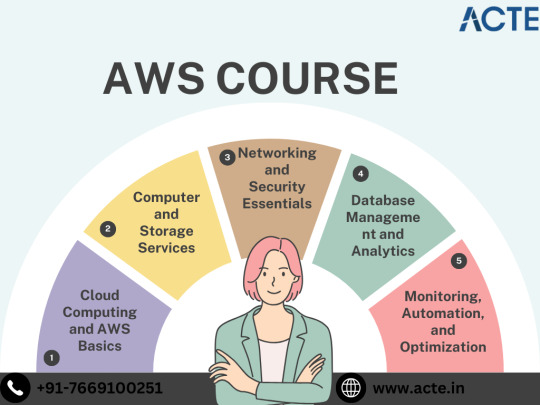
How AWS Helps Different Businesses
Startups & Small Biz
Startups don’t have to worry about investing in hardware. You pay only for what you use, and you can scale as you grow. Imagine running a new app without a giant upfront cost or IT infrastructure to manage. Sounds dreamy, right?
Enterprises & Large Companies
AWS scales up to handle massive workloads. Need to manage huge databases or run advanced AI models? AWS can handle it all. Plus, it’s compliant with global regulations, so you don’t have to worry about security.
Developers & DevOps
For developers, AWS offers tools to streamline development, from building apps to deploying them automatically. Whether it’s using Elastic Beanstalk for app deployment or CodePipeline to automate the release process, AWS makes life easier.
How to Get Started with AWS
Create Your AWS Account: It’s super simple to sign up. Once you’re in, you’ll have access to all AWS services.
Explore the Free Tier: AWS has a free tier that lets you try many services without paying a cent. Perfect for beginners!
Check Out the Docs: AWS has detailed tutorials and resources to guide you through setting up and using their services.
Scale When You’re Ready: As your needs grow, you can scale up your services without breaking a sweat.
Final Thoughts
AWS is changing the game when it comes to cloud computing. With its powerful features, scalability, and security, it’s no surprise that so many businesses trust it to run their operations. Whether you're just starting out or scaling big, AWS has everything you need to succeed.
So, what are you waiting for? Dive into the cloud with AWS and take your business (or project) to the next level.
1 note
·
View note
Text
A Comprehensive Guide to Amazon Web Services (AWS)
Amazon Web Services (AWS) has emerged as a leading cloud computing platform, revolutionizing how businesses and developers deploy and manage applications. Since its inception in 2006, AWS has expanded its offerings to include a vast array of services, catering to various industries and use cases. This guide will help you understand what AWS is, its key features, and how it can benefit your organization.

If you want to advance your career at the AWS Course in Pune, you need to take a systematic approach and join up for a course that best suits your interests and will greatly expand your learning path.
What is AWS?
AWS is a cloud services platform provided by Amazon that enables businesses to access computing power, storage, and various other functionalities via the internet. Rather than investing in physical hardware and infrastructure, organizations can utilize AWS to streamline operations and reduce costs.
Core Services Offered by AWS
AWS provides a wide range of services, but some of the most notable include:
Compute Services: Amazon EC2 (Elastic Compute Cloud) offers scalable virtual servers, while AWS Lambda enables serverless computing, allowing developers to run code without provisioning servers.
Storage Solutions: Amazon S3 (Simple Storage Service) provides scalable object storage for data, while Amazon EBS (Elastic Block Store) offers block storage for use with EC2 instances.
Database Services: AWS supports various database solutions, including Amazon RDS (Relational Database Service) for relational databases and Amazon DynamoDB for NoSQL databases.
Networking: AWS offers services like Amazon VPC (Virtual Private Cloud) for creating isolated networks and Amazon Route 53 for domain name system management.
Machine Learning: With services like Amazon SageMaker, developers can build, train, and deploy machine learning models efficiently.
Key Features of AWS
Scalability: AWS allows users to scale resources up or down based on demand. This capability is especially beneficial for businesses experiencing fluctuating workloads.
Cost-Effectiveness: With a pay-as-you-go pricing model, AWS enables organizations to only pay for the services they use, helping to optimize budgets.
Global Infrastructure: AWS operates data centers in multiple regions around the globe, providing low-latency access and high availability for users worldwide.
Robust Security: AWS implements a comprehensive security framework that includes data encryption, access controls, and compliance with industry standards, ensuring data protection.

To master the intricacies of AWS and unlock its full potential, individuals can benefit from enrolling in the AWS Online Training.
Use Cases for AWS
Web Hosting: Many companies host their websites and applications on AWS, leveraging its scalability and reliability.
Data Analytics: AWS provides tools for big data processing, with services like Amazon EMR (Elastic MapReduce) helping organizations analyze large datasets.
Backup and Recovery: AWS offers robust solutions for data backup and disaster recovery, ensuring that critical information is secure and accessible.
Internet of Things (IoT): AWS IoT Core connects and manages IoT devices, enabling businesses to harness data generated by these devices.
Conclusion
Amazon Web Services has transformed the IT landscape by offering flexible, scalable, and cost-effective cloud solutions. By leveraging AWS, organizations can enhance their operational efficiency, innovate faster, and reduce the burden of managing physical infrastructure. Whether you're a startup or an established enterprise, AWS provides the tools and resources to thrive in today's digital age.
0 notes
Text
AWS Certified Solutions Architect — Associate: A Gateway to Cloud Mastery
In the world of cloud computing, Amazon Web Services (AWS) has established itself as the leader, offering a vast array of cloud services that enable businesses to innovate and scale globally. With more companies moving their infrastructure to the cloud, there’s a growing demand for skilled professionals who can design and deploy scalable, secure, and cost-efficient systems using AWS. One of the best ways to demonstrate your expertise in this area is by obtaining the AWS Certified Solutions Architect — Associate certification.
This certification is ideal for IT professionals looking to build a solid foundation in designing cloud architectures and solutions using AWS services. In this blog, we’ll explore what the AWS Solutions Architect — Associate certification entails, why it’s valuable, what skills it validates, and how it can help propel your career in cloud computing.
What is the AWS Certified Solutions Architect — Associate Certification?
The AWS Certified Solutions Architect — Associate certification is a credential that validates your ability to design and implement distributed systems on AWS. It is designed for individuals who have experience in architecting and deploying applications in the AWS cloud and want to showcase their ability to create secure, high-performance, and cost-efficient cloud solutions.
This certification covers a wide range of AWS services and requires a thorough understanding of architectural best practices, making it one of the most sought-after certifications for cloud professionals. It is typically the first step for individuals aiming to achieve more advanced certifications, such as the AWS Certified Solutions Architect — Professional.
Why is AWS Solutions Architect — Associate Important?
1. High Demand for AWS Skills
As more businesses migrate to AWS, the demand for professionals with AWS expertise has skyrocketed. According to a 2022 report by Global Knowledge, AWS certifications rank among the highest-paying IT certifications globally. The Solutions Architect — Associate certification can help you stand out to potential employers by validating your skills in designing and implementing AWS cloud architectures.
2. Recognition and Credibility
Earning this certification demonstrates that you possess a deep understanding of how to design scalable, secure, and highly available systems on AWS. It is recognized globally by companies and hiring managers as a mark of cloud proficiency, enhancing your credibility and employability in cloud-focused roles such as cloud architect, solutions architect, or systems engineer.
3. Versatile Skill Set
The AWS Solutions Architect — Associate certification provides a broad foundation in AWS services, architecture patterns, and best practices. It covers everything from storage, databases, networking, and security to cost optimization and disaster recovery. These versatile skills are applicable across various industries, making you well-equipped to handle a wide range of cloud-related tasks.

What Skills Will You Learn?
The AWS Certified Solutions Architect — Associate exam is designed to assess your ability to design and deploy robust, scalable, and fault-tolerant systems in AWS. Here’s a breakdown of the key skills and knowledge areas that the certification covers:
1. AWS Core Services
The certification requires a solid understanding of AWS’s core services, including:
Compute: EC2 instances, Lambda (server less computing), and Elastic Load Balancing (ELB).
Storage: S3 (Simple Storage Service), EBS (Elastic Block Store), and Glacier for backup and archival.
Databases: Relational Database Service (RDS), DynamoDB (NoSQL database), and Aurora.
Networking: Virtual Private Cloud (VPC), Route 53 (DNS), and Cloud Front (CDN).
Being familiar with these services is essential for designing effective cloud architectures.
2. Architecting Secure and Resilient Systems
The Solutions Architect — Associate exam focuses heavily on security best practices and resilience. You’ll need to demonstrate how to:
Implement security measures using AWS Identity and Access Management (IAM).
Secure your data using encryption and backup strategies.
Design systems with high availability and disaster recovery by leveraging multi-region and multi-AZ (Availability Zone) setups.
3. Cost Management and Optimization
AWS offers flexible pricing models, and managing costs is a crucial aspect of cloud architecture. The certification tests your ability to:
Select the most cost-efficient compute, storage, and database services for specific workloads.
Implement scaling strategies using Auto Scaling to optimize performance and costs.
Use tools like AWS Cost Explorer and Trusted Advisor to monitor and reduce expenses.
4. Designing for Performance and Scalability
A key part of the certification is learning how to design systems that can scale to handle varying levels of traffic and workloads. You’ll gain skills in:
Using AWS Auto Scaling and Elastic Load Balancing to adjust capacity based on demand.
Designing decoupled architectures using services like Amazon SQS (Simple Queue Service) and SNS (Simple Notification Service).
Optimizing performance for both read- and write-heavy workloads using services like Amazon DynamoDB and RDS.
5. Monitoring and Operational Excellence
Managing cloud environments effectively requires robust monitoring and automation. The exam covers topics such as:
Monitoring systems using Cloud Watch and setting up alerts for proactive management.
Automating tasks like system updates, backups, and scaling using AWS tools such as Cloud Formation and Elastic Beanstalk.
AWS Solutions Architect — Associate Exam Overview
To earn the AWS Certified Solutions Architect — Associate certification, you need to pass the SAA-C03 exam. Here’s an overview of the exam:
Exam Format: Multiple-choice and multiple-response questions.
Number of Questions: 65 questions.
Duration: 130 minutes (2 hours and 10 minutes).
Passing Score: A score between 720 and 1000 (the exact passing score varies by exam version).
Cost: $150 USD.
The exam focuses on four main domains:
Design Secure Architectures (30%)
Design Resilient Architectures (26%)
Design High-Performing Architectures (24%)
Design Cost-Optimized Architectures (20%)
These domains reflect the key competencies required to design and deploy systems in AWS effectively.
How to Prepare for the AWS Solutions Architect — Associate Exam
Preparing for the AWS Solutions Architect — Associate exam requires a blend of theoretical knowledge and practical experience. Here are some steps to help you succeed:
AWS Training Courses: AWS offers several training courses, including the official “Architecting on AWS” course, which provides comprehensive coverage of exam topics.
Hands-On Experience: AWS’s free tier allows you to explore and experiment with key services like EC2, S3, and VPC. Building real-world projects will reinforce your understanding of cloud architecture.
Study Guides and Books: There are numerous books and online resources dedicated to preparing for the Solutions Architect exam. Popular books like “AWS Certified Solutions Architect Official Study Guide” provide detailed coverage of exam objectives.
Practice Exams: Taking practice tests can help familiarize you with the exam format and highlight areas that need more attention. AWS offers sample questions, and third-party platforms like Whiz labs and Udemy provide full-length practice exams.
Conclusion
Earning the AWS Certified Solutions Architect — Associate certification is a significant achievement that can open up new career opportunities in the fast-growing cloud computing field. With its focus on core AWS services, security best practices, cost optimization, and scalable architectures, this certification validates your ability to design and implement cloud solutions that meet modern business needs.
Whether you’re an IT professional looking to specialize in cloud computing or someone aiming to advance your career, the AWS Solutions Architect — Associate certification can provide the knowledge and credibility needed to succeed in today’s cloud-driven world.
0 notes
Text
AWS Managed Services: Revolutionizing Cloud Management with Goognu
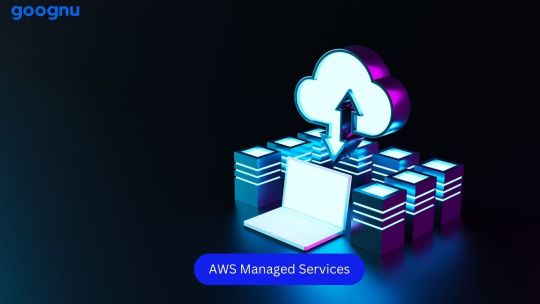
AWS Managed Services | Goognu
In today’s digital age, businesses are increasingly embracing cloud computing to drive innovation, enhance efficiency, and streamline operations. Amazon Web Services (AWS) has emerged as a leader in this space, offering a suite of scalable, secure, and robust solutions. However, managing AWS infrastructure effectively can be a complex and resource-intensive task. This is where AWS Managed Services come into play, enabling businesses to focus on their core competencies while leaving the technical complexities to experts.
What Are AWS Managed Services?
AWS Managed Services refer to a set of comprehensive offerings designed to simplify the deployment, management, and optimization of AWS environments. These services handle operational tasks such as infrastructure provisioning, monitoring, performance tuning, security management, and compliance. By leveraging AWS Managed Services, businesses can reduce operational overhead, enhance security, and optimize performance, all while ensuring cost efficiency.
An AWS Managed Service Provider (MSP) is an expert intermediary that specializes in maintaining and customizing AWS infrastructure. They help organizations maximize their AWS investments by providing tailored solutions to meet unique business needs.
Why Choose AWS Managed Services?
Managing a cloud infrastructure effectively requires specialized expertise, tools, and significant time investment. AWS Managed Services offer several advantages:
·Simplified Operations: Automate routine tasks such as monitoring, patching, and backups.
·Enhanced Security: Implement advanced security measures to protect sensitive data.
·Cost Optimization: Identify and eliminate unnecessary expenses while optimizing resource usage.
·Scalability: Ensure infrastructure adapts seamlessly to fluctuating workloads.
·24/7 Support: Access round-the-clock technical assistance.
Goognu: Your Trusted Partner for AWS Managed Services
With over a decade of experience, Goognu has established itself as a leading provider of AWS Managed Services. The company offers end-to-end solutions tailored to help businesses harness the full potential of AWS. Whether it’s designing a cloud strategy, deploying infrastructure, or managing ongoing operations, Goognu’s team of AWS-certified experts ensures exceptional results.
Key Features of Goognu’s AWS Managed Services
1. Infrastructure Automation and Operations Goognu streamlines cloud management by automating tasks like resource provisioning, patch management, and backup. Leveraging tools like AWS CloudFormation and CloudWatch, they deliver efficient and reliable infrastructure solutions.
2. Security and Compliance Security is paramount in today’s digital landscape. Goognu implements best practices and services like AWS Identity and Access Management (IAM), Virtual Private Cloud (VPC), and Key Management Service (KMS) to ensure robust data protection and regulatory compliance.
3. Monitoring and Performance Optimization Goognu’s experts monitor AWS resources in real-time using tools such as AWS CloudWatch and AWS Config. They proactively identify and resolve performance bottlenecks, ensuring seamless operations.
4. Cost Optimization Goognu helps businesses minimize costs by optimizing resource allocation, leveraging reserved instances, and implementing auto-scaling capabilities. Their cost management strategies ensure clients maximize their ROI.
5. 24/7 Support With round-the-clock support, Goognu’s team is always available to address client concerns. Their proactive approach minimizes downtime and ensures uninterrupted operations.
6. Big Data and Analytics Goognu’s expertise in AWS analytics services like Amazon Redshift and EMR enables businesses to derive actionable insights from data, empowering informed decision-making.
The Benefits of Partnering with Goognu for AWS Managed Services
1. Extensive Industry Experience
With over 13 years of hands-on experience, Goognu has a deep understanding of AWS environments and the challenges faced by businesses across industries. Their expertise ensures tailored solutions for every client.
2. Comprehensive Service Portfolio
From infrastructure setup and monitoring to data analytics and compliance, Goognu offers a wide range of services that cover every aspect of cloud management. Their holistic approach ensures seamless integration and optimized performance.
3. Enhanced Security Measures
Goognu employs advanced security technologies to protect customer data and applications. Their focus on compliance ensures businesses meet industry standards effortlessly.
4. Cost-Efficient Solutions
Goognu’s cost optimization strategies are designed to reduce unnecessary expenses while improving efficiency. They help businesses achieve significant savings without compromising on performance.
5. Reliable Support
Goognu’s 24/7 support ensures that businesses have access to expert assistance whenever needed. This reliable service minimizes downtime and enhances overall productivity.
Practical Applications of AWS Managed Services
AWS Managed Services cater to a variety of industries and use cases. Here’s how different sectors benefit from these services:
·E-Commerce: Goognu ensures seamless customer experiences by optimizing infrastructure for high traffic and leveraging real-time analytics.
·Healthcare: Secure and compliant data storage helps healthcare organizations meet regulatory requirements such as HIPAA.
·Finance: Financial institutions use Goognu’s services to build analytics platforms for fraud detection and customer insights.
·Manufacturing: Goognu supports IoT deployment with AWS IoT Core, facilitating predictive maintenance and operational efficiency.
Key AWS Services Managed by Goognu
Goognu’s expertise spans a wide range of AWS offerings, including:
·Compute: Management of EC2 instances and auto-scaling groups.
·Storage: Configuration of Amazon S3, Elastic Block Store (EBS), and Glacier.
·Networking: Deployment of Virtual Private Clouds (VPCs), Elastic Load Balancers (ELBs), and Route 53.
·Database: Administration of Amazon RDS and DynamoDB.
·Analytics: Implementation of Amazon Redshift and EMR for big data processing.
·Monitoring: Real-time tracking with AWS CloudWatch and AWS Config.
The Future of AWS Managed Services
As cloud adoption continues to grow, the demand for AWS Managed Services is expected to rise. Businesses will increasingly seek solutions that incorporate automation, advanced analytics, and enhanced security. With AWS consistently innovating its platform, service providers like Goognu will play a pivotal role in helping organizations adapt to new technologies and achieve their cloud goals.
Conclusion
In a competitive business landscape, effective cloud management is essential for success. AWS Managed Services provide the tools, expertise, and support needed to optimize AWS environments, reduce costs, and enhance performance. Partnering with a trusted provider like Goognu ensures that businesses can focus on innovation and growth without being bogged down by technical complexities.
0 notes
Text
AWS Course with Placement Assistance in Pune: Why It's Worth Your Investment
In today’s tech-driven world, cloud computing has become a critical component for businesses of all sizes, and Amazon Web Services (AWS) stands out as the industry leader. AWS powers a vast majority of cloud infrastructure, and organizations are continuously seeking professionals who are proficient in managing AWS environments. For IT professionals and aspiring cloud specialists, taking an AWS course in Pune with placement assistance is a smart investment. It not only enhances your technical skills but also opens doors to lucrative career opportunities.
In this article, we’ll explore why enrolling in an AWS course in Pune with placement assistance is worth your investment and how it can help you build a successful career in the rapidly growing cloud computing sector.
1. AWS is the Leading Cloud Platform
Amazon Web Services is the most widely adopted cloud platform globally, with a comprehensive suite of tools and services. From cloud storage and computing to machine learning and big data analytics, AWS offers solutions that businesses rely on to streamline operations and innovate.
As cloud adoption accelerates across industries, the demand for AWS-skilled professionals continues to rise. By choosing an AWS course in Pune with placement, you align yourself with the most popular and highly sought-after cloud platform. Not only does this equip you with practical AWS skills, but it also increases your employability in the cloud computing domain, where AWS expertise is in high demand.
2. Placement Assistance: A Stepping Stone to Your Dream Job
One of the key reasons why an AWS course in Pune with placement assistance is worth the investment is the direct support you receive in securing a job. Placement assistance is a vital component of most AWS training programs, especially in Pune, which is home to a burgeoning IT industry with numerous multinational corporations and startups actively hiring cloud professionals.
Here’s how placement assistance helps:
Industry Connections: Many training institutes have strong relationships with companies in Pune and beyond, allowing them to connect students with hiring managers in top organizations.
Resume Building: Placement assistance often includes resume preparation, ensuring that your AWS-related skills and certifications are highlighted to potential employers.
Mock Interviews: To help you prepare for the competitive job market, placement support typically includes mock interviews where you can practice answering common AWS-related questions, boosting your confidence.
Job Search Support: Many institutes actively assist students in applying to relevant job openings, increasing your chances of finding the right role.
In short, placement assistance takes the guesswork out of job hunting by providing you with the resources, connections, and support you need to land a cloud computing job after completing your training.
3. Comprehensive Learning Experience
An AWS course in Pune with placement is designed to provide a well-rounded learning experience that covers both the theoretical and practical aspects of working with AWS. Whether you’re a beginner or an experienced IT professional, a structured course will guide you through AWS’s vast ecosystem, covering topics such as:
Core AWS Services: Learn the fundamental AWS services like EC2 (Elastic Compute Cloud), S3 (Simple Storage Service), VPC (Virtual Private Cloud), and RDS (Relational Database Service).
Cloud Architecture and Security: Gain expertise in designing secure, scalable, and cost-effective AWS solutions, and learn about cloud security best practices.
Automation and DevOps: For professionals looking to specialize in DevOps, AWS courses provide insights into automating cloud operations with services like AWS CloudFormation and AWS Lambda.
Real-World Projects: Many AWS courses include hands-on labs and real-world projects that help you apply what you’ve learned in a practical setting, ensuring you’re job-ready by the end of the course.
With comprehensive training, you’ll not only learn how to use AWS services effectively but also understand how to design, deploy, and manage cloud applications in real-world business environments.
4. AWS Certification: A Gateway to Career Advancement
AWS offers various certifications that validate your expertise and knowledge of its services. Completing an AWS course in Pune with placement assistance gives you the opportunity to earn these valuable certifications, such as:
AWS Certified Cloud Practitioner (for beginners)
AWS Certified Solutions Architect – Associate
AWS Certified Developer – Associate
AWS Certified SysOps Administrator – Associate
AWS Certified DevOps Engineer – Professional
Certification is crucial in today’s competitive job market as it demonstrates your proficiency with AWS services and sets you apart from other candidates. An AWS course in Pune with placement not only provides the training you need to pass these exams but also ensures that you are prepared to handle real-world cloud challenges.
AWS-certified professionals are in high demand, and certification can significantly increase your chances of securing a high-paying role. With the added benefit of placement assistance, you’ll be better equipped to achieve your career goals and pursue the many job opportunities available in cloud computing.
5. Pune: A Hub for IT Jobs and Cloud Opportunities
Pune has quickly become one of India’s premier destinations for IT and technology jobs. With its rapidly growing tech industry and presence of numerous global tech giants, Pune is a hub for cloud computing and AWS-related roles. Companies in Pune are actively looking for skilled AWS professionals to help them manage and scale their cloud infrastructure, ensuring that opportunities in this sector are abundant.
By taking an AWS course in Pune with placement, you position yourself in the heart of one of India’s largest IT job markets. Pune offers access to a wealth of career opportunities with top companies looking for cloud experts, giving you a competitive edge in the job market.
6. Flexible Learning Options
An AWS course in Pune with placement typically offers flexible learning options, allowing you to choose the format that best fits your schedule and learning style. Whether you prefer classroom-based learning, online training, or a hybrid approach, many institutes in Pune provide various formats to suit your needs.
Classroom Learning: A traditional, instructor-led setting where you can interact with your trainer and peers for a more immersive experience.
Online Learning: If you have a busy schedule, online courses offer the flexibility to learn at your own pace from the comfort of your home.
Hybrid Learning: A combination of both classroom and online training, allowing you to balance practical learning with flexibility.
These flexible options ensure that you can complete the AWS course while maintaining your professional and personal commitments.
7. Growing Job Opportunities in AWS
The cloud computing industry is expected to continue its rapid growth over the coming years, and AWS will remain a dominant force in the market. As organizations continue to migrate to the cloud, the demand for AWS-certified professionals will only increase. Roles such as AWS Solutions Architect, Cloud Engineer, DevOps Engineer, and Cloud Consultant are all in high demand.
An AWS course in Pune with placement offers you a chance to be part of this growing job market. With proper training and certification, you’ll be well-positioned to secure a job with a competitive salary and excellent career growth prospects.
Conclusion
An AWS course in Pune with placement is an investment that can pay off exponentially in terms of career growth, job security, and earning potential. With the growing demand for AWS professionals in Pune’s thriving tech industry, enrolling in a course with placement assistance ensures that you not only gain in-depth knowledge of AWS but also receive the support necessary to secure a job in this highly competitive field. Whether you are looking to start your career in cloud computing or advance your existing skill set, AWS training with placement is the key to unlocking a successful and rewarding future in the cloud.
0 notes
Text
From Novice to Pro: Master the Cloud with AWS Training!
In today's rapidly evolving technology landscape, cloud computing has emerged as a game-changer, providing businesses with unparalleled flexibility, scalability, and cost-efficiency. Among the various cloud platforms available, Amazon Web Services (AWS) stands out as a leader, offering a comprehensive suite of services and solutions. Whether you are a fresh graduate eager to kickstart your career or a seasoned professional looking to upskill, AWS training can be the gateway to success in the cloud. This article explores the key components of AWS training, the reasons why it is a compelling choice, the promising placement opportunities it brings, and the numerous benefits it offers.

Key Components of AWS Training
1. Foundational Knowledge: Building a Strong Base
AWS training starts by laying a solid foundation of cloud computing concepts and AWS-specific terminology. It covers essential topics such as virtualization, storage types, networking, and security fundamentals. This groundwork ensures that even individuals with little to no prior knowledge of cloud computing can grasp the intricacies of AWS technology easily.
2. Core Services: Exploring the AWS Portfolio
Once the fundamentals are in place, AWS training delves into the vast array of core services offered by the platform. Participants learn about compute services like Amazon Elastic Compute Cloud (EC2), storage options such as Amazon Simple Storage Service (S3), and database solutions like Amazon Relational Database Service (RDS). Additionally, they gain insights into services that enhance performance, scalability, and security, such as Amazon Virtual Private Cloud (VPC), AWS Identity and Access Management (IAM), and AWS CloudTrail.
3. Specialized Domains: Nurturing Expertise
As participants progress through the training, they have the opportunity to explore advanced and specialized areas within AWS. These can include topics like machine learning, big data analytics, Internet of Things (IoT), serverless computing, and DevOps practices. By delving into these niches, individuals can gain expertise in specific domains and position themselves as sought-after professionals in the industry.

Reasons to Choose AWS Training
1. Industry Dominance: Aligning with the Market Leader
One of the significant reasons to choose AWS training is the platform's unrivaled market dominance. With a staggering market share, AWS is trusted and adopted by businesses across industries worldwide. By acquiring AWS skills, individuals become part of the ecosystem that powers the digital transformation of numerous organizations, enhancing their career prospects significantly.
2. Comprehensive Learning Resources: Abundance of Educational Tools
AWS training offers a wealth of comprehensive learning resources, ranging from extensive documentation, tutorials, and whitepapers to hands-on labs and interactive courses. These resources cater to different learning preferences, enabling individuals to choose their preferred mode of learning and acquire a deep understanding of AWS services and concepts.
3. Recognized Certifications: Validating Expertise
AWS certifications are globally recognized credentials that validate an individual's competence in using AWS services and solutions effectively. By completing AWS training and obtaining certifications like AWS Certified Solutions Architect or AWS Certified Developer, individuals can boost their professional credibility, open doors to new job opportunities, and command higher salaries in the job market.
Placement Opportunities
Upon completing AWS training, individuals can explore a multitude of placement opportunities. The demand for professionals skilled in AWS is soaring, as organizations increasingly migrate their infrastructure to the cloud or adopt hybrid cloud strategies. From startups to multinational corporations, industries spanning finance, healthcare, retail, and more seek talented individuals who can architect, develop, and manage cloud-based solutions using AWS. This robust demand translates into a plethora of rewarding career options and a higher likelihood of finding positions that align with one's interests and aspirations.

In conclusion, mastering the cloud with AWS training at ACTE institute provides individuals with a solid foundation, comprehensive knowledge, and specialized expertise in one of the most dominant cloud platforms available. The reasons to choose AWS training are compelling, ranging from the industry's unparalleled market position to the top ranking state.
9 notes
·
View notes
Text
Navigating the Cloud: Unleashing Amazon Web Services' (AWS) Impact on Digital Transformation
In the ever-evolving realm of technology, cloud computing stands as a transformative force, offering unparalleled flexibility, scalability, and cost-effectiveness. At the forefront of this paradigm shift is Amazon Web Services (AWS), a comprehensive cloud computing platform provided by Amazon.com. For those eager to elevate their proficiency in AWS, specialized training initiatives like AWS Training in Pune offer invaluable insights into maximizing the potential of AWS services.

Exploring AWS: A Catalyst for Digital Transformation
As we traverse the dynamic landscape of cloud computing, AWS emerges as a pivotal player, empowering businesses, individuals, and organizations to fully embrace the capabilities of the cloud. Let's delve into the multifaceted ways in which AWS is reshaping the digital landscape and providing a robust foundation for innovation.
Decoding the Heart of AWS
AWS in a Nutshell: Amazon Web Services serves as a robust cloud computing platform, delivering a diverse range of scalable and cost-effective services. Tailored to meet the needs of individual users and large enterprises alike, AWS acts as a gateway, unlocking the potential of the cloud for various applications.
Core Function of AWS: At its essence, AWS is designed to offer on-demand computing resources over the internet. This revolutionary approach eliminates the need for substantial upfront investments in hardware and infrastructure, providing users with seamless access to a myriad of services.
AWS Toolkit: Key Services Redefined
Empowering Scalable Computing: Through Elastic Compute Cloud (EC2) instances, AWS furnishes virtual servers, enabling users to dynamically scale computing resources based on demand. This adaptability is paramount for handling fluctuating workloads without the constraints of physical hardware.
Versatile Storage Solutions: AWS presents a spectrum of storage options, such as Amazon Simple Storage Service (S3) for object storage, Amazon Elastic Block Store (EBS) for block storage, and Amazon Glacier for long-term archival. These services deliver robust and scalable solutions to address diverse data storage needs.
Streamlining Database Services: Managed database services like Amazon Relational Database Service (RDS) and Amazon DynamoDB (NoSQL database) streamline efficient data storage and retrieval. AWS simplifies the intricacies of database management, ensuring both reliability and performance.
AI and Machine Learning Prowess: AWS empowers users with machine learning services, exemplified by Amazon SageMaker. This facilitates the seamless development, training, and deployment of machine learning models, opening new avenues for businesses integrating artificial intelligence into their applications. To master AWS intricacies, individuals can leverage the Best AWS Online Training for comprehensive insights.
In-Depth Analytics: Amazon Redshift and Amazon Athena play pivotal roles in analyzing vast datasets and extracting valuable insights. These services empower businesses to make informed, data-driven decisions, fostering innovation and sustainable growth.
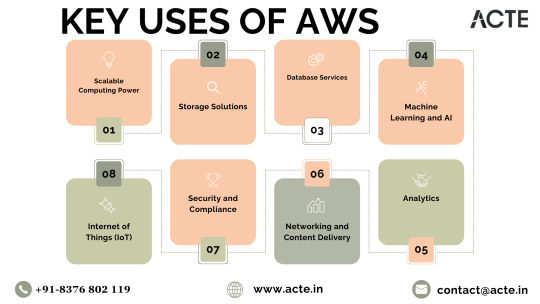
Networking and Content Delivery Excellence: AWS services, such as Amazon Virtual Private Cloud (VPC) for network isolation and Amazon CloudFront for content delivery, ensure low-latency access to resources. These features enhance the overall user experience in the digital realm.
Commitment to Security and Compliance: With an unwavering emphasis on security, AWS provides a comprehensive suite of services and features to fortify the protection of applications and data. Furthermore, AWS aligns with various industry standards and certifications, instilling confidence in users regarding data protection.
Championing the Internet of Things (IoT): AWS IoT services empower users to seamlessly connect and manage IoT devices, collect and analyze data, and implement IoT applications. This aligns seamlessly with the burgeoning trend of interconnected devices and the escalating importance of IoT across various industries.
Closing Thoughts: AWS, the Catalyst for Transformation
In conclusion, Amazon Web Services stands as a pioneering force, reshaping how businesses and individuals harness the power of the cloud. By providing a dynamic, scalable, and cost-effective infrastructure, AWS empowers users to redirect their focus towards innovation, unburdened by the complexities of managing hardware and infrastructure. As technology advances, AWS remains a stalwart, propelling diverse industries into a future brimming with endless possibilities. The journey into the cloud with AWS signifies more than just migration; it's a profound transformation, unlocking novel potentials and propelling organizations toward an era of perpetual innovation.
2 notes
·
View notes
Text
10+ AWS Projects for Students to Showcase Cloud Skills

Cloud computing has revolutionized how businesses and individuals manage data, offering scalable and reliable solutions. Amazon Web Services (AWS) is at the forefront of this transformation, providing a vast array of tools and services for deploying, managing, and optimizing applications. For students eager to showcase their cloud skills, working on AWS projects can be a great way to gain hands-on experience and enhance their portfolios.https://internshipgate.com
Here’s a list of 10+ AWS projects that students can explore to demonstrate their cloud computing expertise:
1. Build a Static Website on AWS S3
Host a fully functional static website using AWS S3. Combine it with Amazon CloudFront for faster content delivery and Route 53 for domain management.
Skills Highlighted: S3 bucket setup, DNS configuration, content delivery network (CDN) integration.
2. Create a Personal Portfolio Using AWS Amplify
AWS Amplify simplifies app development and hosting. Build a personal portfolio showcasing your AWS projects and deploy it using Amplify.
Skills Highlighted: Frontend development, CI/CD, deployment pipeline.
3. Deploy a Serverless Application Using AWS Lambda
Develop a serverless application that performs specific tasks (e.g., image processing or text analysis) using AWS Lambda. Integrate it with API Gateway and DynamoDB for data storage.
Skills Highlighted: Serverless architecture, API integration, database management.
4. Set Up a Virtual Private Cloud (VPC)
Design a secure and scalable AWS VPC. Configure subnets, route tables, and internet gateways. Optionally, simulate a hybrid cloud by integrating with an on-premises network using AWS VPN.
Skills Highlighted: Networking, security, infrastructure setup.
5. Launch a Machine Learning Model on AWS SageMaker
Train and deploy a machine learning model using Amazon SageMaker. Use datasets from Kaggle or AWS Open Data Registry to predict trends or analyze data.
Skills Highlighted: Machine learning, data preprocessing, model deployment.
6. Implement a Real-Time Chat Application
Build a chat application using AWS AppSync for real-time data syncing. Combine it with Cognito for user authentication and DynamoDB for storing messages.
Skills Highlighted: Real-time data synchronization, user management, app development.
7. Design an IoT System with AWS IoT Core
Create an IoT application where devices send data to AWS IoT Core. Visualize this data using AWS QuickSight or store it in Amazon RDS for analytics.
Skills Highlighted: IoT integration, data visualization, cloud database management.
8. Build a Scalable E-Commerce Platform
Develop an e-commerce prototype using Amazon EC2 for hosting, RDS for database management, and S3 for storing product images. Enhance the platform with CloudFront for speed optimization.
Skills Highlighted: Full-stack development, scalability, cloud storage.
9. Implement Disaster Recovery with AWS Backup
Simulate a disaster recovery system by configuring AWS Backup to automatically create backups of your database and storage. Test restoring from backups to ensure reliability.
Skills Highlighted: Backup management, reliability engineering, disaster recovery.
10. Analyze Big Data with AWS Glue and Athena
Extract and transform data using AWS Glue and query it using Athena. Pair this project with Amazon S3 for storage and QuickSight for visualization.
Skills Highlighted: Data analysis, ETL (Extract, Transform, Load), data querying.
11. Create a Photo Album Using AWS Rekognition
Develop a photo album application that uses Amazon Rekognition to analyze and tag uploaded photos. Add search functionality based on identified objects or people.
Skills Highlighted: AI/ML integration, image processing, app functionality.
12. Host a CI/CD Pipeline with AWS CodePipeline
Set up a CI/CD pipeline for a simple app using AWS CodePipeline. Integrate it with CodeCommit for version control and CodeBuild for automated builds.
Skills Highlighted: DevOps, CI/CD, version control integration.
Tips to Maximize Your Learning
Start with small projects and gradually move to complex ones.
Document your process on GitHub or a personal blog to share your learning.
Explore AWS Free Tier to keep costs manageable during project development.
Join AWS communities or forums to seek help and collaborate with peers.
Conclusion
Completing AWS projects not only helps you understand cloud computing concepts but also gives you practical experience with industry-relevant tools. Whether you’re building applications, managing infrastructure, or exploring AI, these projects will make your portfolio stand out to potential employers.https://internshipgate.com
#career#internship#virtualinternship#internshipgate#internship in india#education#cloud computing#aws cloud#aws course#projects
0 notes
Text
What Is AWS EKS? Use EKS To Simplify Kubernetes On AWS
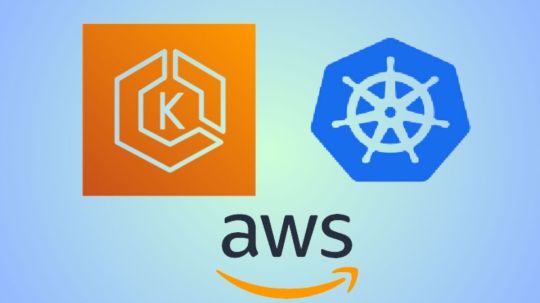
What Is AWS EKS?
AWS EKS, a managed service, eliminates the need to install, administer, and maintain your own Kubernetes control plane on Amazon Web Services (AWS). Kubernetes simplifies containerized app scaling, deployment, and management.
How it Works?
AWS Elastic Kubernetes Service (Amazon EKS) is a managed Kubernetes solution for on-premises data centers and the AWS cloud. The Kubernetes control plane nodes in the cloud that are in charge of scheduling containers, controlling application availability, storing cluster data, and other crucial functions are automatically managed in terms of scalability and availability by AWS EKS.
You can benefit from all of AWS infrastructure’s performance, scalability, dependability, and availability with Amazon EKS. You can also integrate AWS networking and security services. When deployed on-premises on AWS Outposts, virtual machines, or bare metal servers, EKS offers a reliable, fully supported Kubernetes solution with integrated tools.Image Credit To Amazon Web Services
AWS EKS advantages
Integration of AWS Services
Make use of the integrated AWS services, including EC2, VPC, IAM, EBS, and others.
Cost reductions with Kubernetes
Use automated Kubernetes application scalability and effective computing resource provisioning to cut expenses.
Security of automated Kubernetes control planes
By automatically applying security fixes to the control plane of your cluster, you can guarantee a more secure Kubernetes environment
Use cases
Implement in a variety of hybrid contexts
Run Kubernetes in your data centers and manage your Kubernetes clusters and apps in hybrid environments.
Workflows for model machine learning (ML)
Use the newest GPU-powered instances from Amazon Elastic Compute Cloud (EC2), such as Inferentia, to efficiently execute distributed training jobs. Kubeflow is used to deploy training and inferences.
Create and execute web apps
With innovative networking and security connections, develop applications that operate in a highly available configuration across many Availability Zones (AZs) and automatically scale up and down.
Amazon EKS Features
Running Kubernetes on AWS and on-premises is made simple with Amazon Elastic Kubernetes Service (AWS EKS), a managed Kubernetes solution. An open-source platform called Kubernetes makes it easier to scale, deploy, and maintain containerized apps. Existing apps that use upstream Kubernetes can be used with Amazon EKS as it is certified Kubernetes-conformant.
The Kubernetes control plane nodes that schedule containers, control application availability, store cluster data, and perform other crucial functions are automatically scaled and made available by Amazon EKS.
You may run your Kubernetes apps on AWS Fargate and Amazon Elastic Compute Cloud (Amazon EC2) using Amazon EKS. You can benefit from all of AWS infrastructure’s performance, scalability, dependability, and availability with Amazon EKS. It also integrates with AWS networking and security services, including AWS Virtual Private Cloud (VPC) support for pod networking, AWS Identity and Access Management (IAM) integration with role-based access control (RBAC), and application load balancers (ALBs) for load distribution.
Managed Kubernetes Clusters
Managed Control Plane
Across several AWS Availability Zones (AZs), AWS EKS offers a highly available and scalable Kubernetes control plane. The scalability and availability of Kubernetes API servers and the etcd persistence layer are automatically managed by Amazon EKS. To provide high availability, Amazon EKS distributes the Kubernetes control plane throughout three AZs. It also automatically identifies and swaps out sick control plane nodes.
Service Integrations
You may directly manage AWS services from within your Kubernetes environment with AWS Controllers for Kubernetes (ACK). Building scalable and highly available Kubernetes apps using AWS services is made easy with ACK.
Hosted Kubernetes Console
For Kubernetes clusters, EKS offers an integrated console. Kubernetes apps running on AWS EKS may be arranged, visualized, and troubleshooted in one location by cluster operators and application developers using EKS. All EKS clusters have automatic access to the EKS console, which is hosted by AWS.
EKS Add-Ons
Common operational software for expanding the operational capability of Kubernetes is EKS add-ons. The add-on software may be installed and updated via EKS. Choose whatever add-ons, such as Kubernetes tools for observability, networking, auto-scaling, and AWS service integrations, you want to run in an Amazon EKS cluster when you first launch it.
Managed Node Groups
With just one command, you can grow, terminate, update, and build nodes for your cluster using AWS EKS. To cut expenses, these nodes can also make use of Amazon EC2 Spot Instances. Updates and terminations smoothly deplete nodes to guarantee your apps stay accessible, while managed node groups operate Amazon EC2 instances utilizing the most recent EKS-optimized or customized Amazon Machine Images (AMIs) in your AWS account.
AWS EKS Connector
Any conformant Kubernetes cluster may be connected to AWS using AWS EKS, and it can be seen in the Amazon EKS dashboard. Any conformant Kubernetes cluster can be connected, including self-managed clusters on Amazon Elastic Compute Cloud (Amazon EC2), Amazon EKS Anywhere clusters operating on-premises, and other Kubernetes clusters operating outside of AWS. You can access all linked clusters and the Kubernetes resources running on them using the Amazon EKS console, regardless of where your cluster is located.
Read more on Govindhtech.com
#AWSEKS#AmazonWebServices#AWSservices#AWSVirtualPrivateCloud#AmazonEC2#News#Technews#technology#technologynews#govindhtech
0 notes
Text
cloud azure,
cloud azure,
In today’s fast-evolving digital landscape, businesses need robust, scalable, and cost-effective solutions to manage their IT infrastructure. Amazon Web Services (AWS), the cloud computing platform by Amazon, has emerged as a leader in this domain, empowering organizations across the globe to innovate, scale, and thrive.
What is AWS Cloud?
AWS Cloud is a comprehensive suite of cloud computing services that provides infrastructure, platform, and software solutions on a pay-as-you-go basis. Launched in 2006, AWS offers over 200 fully featured services, including computing power, storage, networking, artificial intelligence (AI), machine learning (ML), and analytics, enabling businesses to run virtually any application in the cloud.
Key Features of AWS
Scalability: AWS allows businesses to scale their resources up or down based on demand, ensuring optimal performance and cost-efficiency.
Global Infrastructure: With data centers in multiple geographic regions, AWS ensures low-latency access and disaster recovery capabilities.
Security: AWS offers robust security features, including encryption, identity access management, and compliance certifications.
Flexibility: Support for multiple programming languages and tools makes AWS adaptable to diverse business needs.
Cost-Efficiency: AWS’s pay-as-you-go model eliminates upfront infrastructure costs, making it an attractive option for businesses of all sizes.
Popular AWS Services
Compute:
Amazon EC2 (Elastic Compute Cloud): Provides scalable virtual servers.
AWS Lambda: Executes code without provisioning servers.
Storage:
Amazon S3 (Simple Storage Service): Object storage with high availability and durability.
Amazon EBS (Elastic Block Store): Block storage for use with EC2 instances.
Database:
Amazon RDS (Relational Database Service): Managed databases like MySQL, PostgreSQL, and Oracle.
Amazon DynamoDB: NoSQL database for high-performance applications.
Networking:
Amazon VPC (Virtual Private Cloud): Isolated network environments.
Amazon CloudFront: Content delivery network (CDN) for fast data delivery.
Machine Learning:
Amazon SageMaker: Tools for building, training, and deploying ML models.
Benefits of AWS for Businesses
Accelerated Innovation: AWS’s vast range of tools allows businesses to experiment and deploy new applications faster.
Global Reach: Organizations can expand operations seamlessly using AWS’s global presence.
Reduced Costs: The pay-as-you-go model minimizes capital expenditure.
Enhanced Agility: Businesses can quickly adapt to changing market demands.
Reliability: AWS’s architecture is designed for high availability and resilience.
Use Cases of AWS
Startups: Launching applications quickly without significant initial investment.
Enterprises: Migrating legacy systems to the cloud for better efficiency.
Government and Education: Hosting applications securely and scaling services for public use.
Healthcare: Analyzing large datasets to improve patient outcomes.
Media and Entertainment: Delivering content globally with low latency.
Conclusion
AWS Cloud has revolutionized the way businesses approach IT infrastructure, offering unparalleled flexibility, scalability, and innovation. As more organizations embrace digital transformation, AWS continues to lead the way, powering the next generation of cloud-based solutions. Whether you're a startup looking to build a new product or a large enterprise aiming to modernize operations, AWS provides the tools and resources to turn your vision into reality.
0 notes